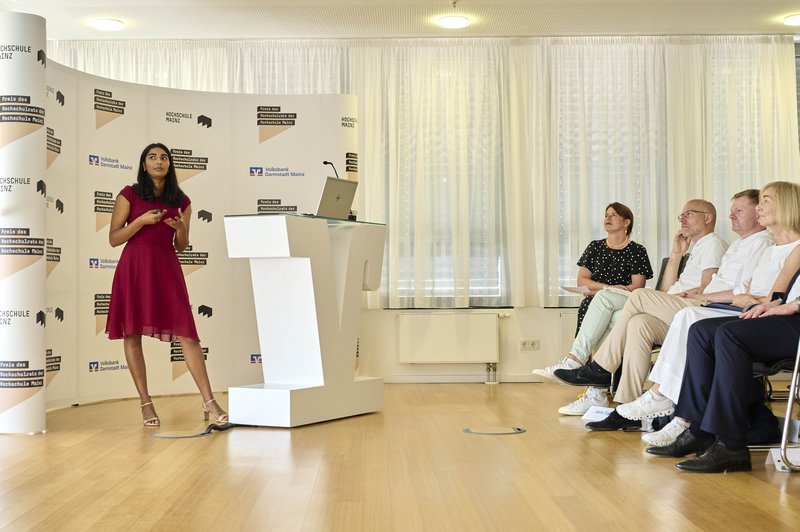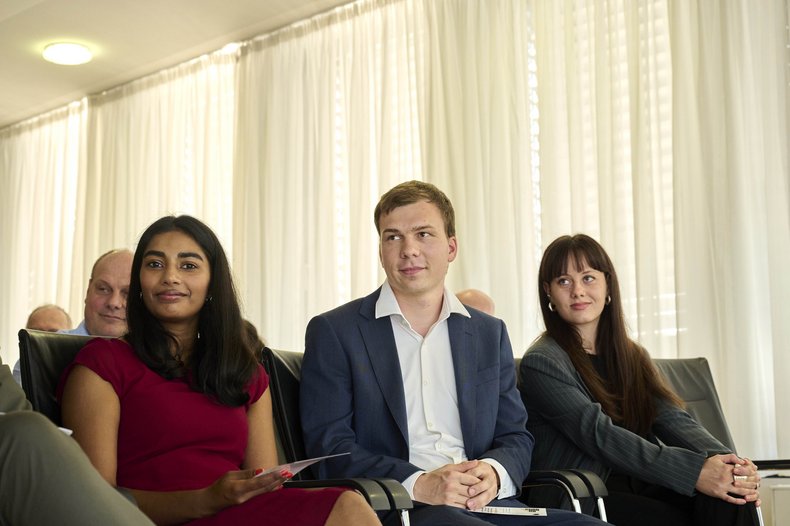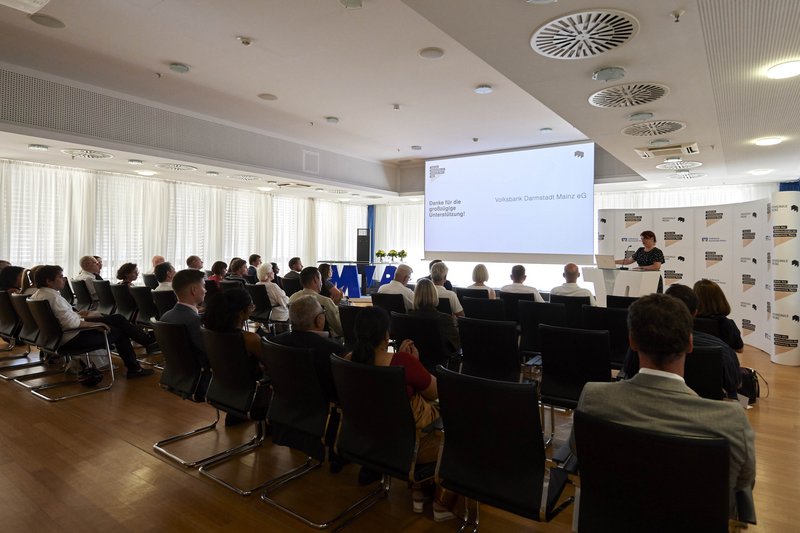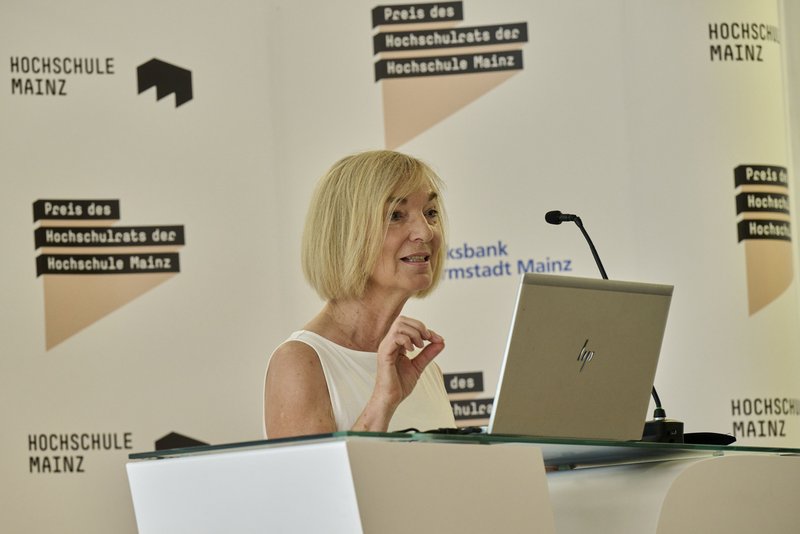Mainz University of Applied Sciences University Council Award honors three outstanding academic achievements
On July 1, 2025, Prof. Dr. Susanne Weissman, President of Mainz University of Applied Sciences, and Prof. Dr. Michael Maskos, Chair of the University Council, presented the University Council Award for outstanding academic achievements at a ceremony at Volksbank Darmstadt Mainz. Prof. Dr. Susanne Weissman emphasized at the award ceremony: "The work submitted not only reflects a high level of professional knowledge, but also demonstrates a deep understanding of the current challenges facing our society. We are proud that our students are working passionately and innovatively on solutions for a sustainable and fair future." This year, three graduates of Mainz University of Applied Sciences were honored with the award, which is sponsored by Volksbank Darmstadt Mainz and endowed with a total of 10,000 Euro.
- 1st place: Endowed with 5,000 Euro, awarded to Deepa Heckes, graduate of the Master’s degree program in International Business at the School of Business
Master’s thesis: The Role of Leadership Styles in Mitigating Technostress and Enhancing Work Motivation
Advisors: Prof. Dr. Susanne Rank and Dr. David Bausch, School of Business
- 2nd place: Endowed with 3,000 Euro awarded to Daniel Muth, graduate of the Bachelor’s degree program in Civil Engineering at the School of Engineering
Bachelor’s thesis: Zum Einfluss der hochtemperaturabhängigen Werkstoffeigenschaften von Stahl auf den Kraftfluss in Stabtragwerken (On the influence of the high-temperature-dependent material properties of steel on the distribution of forces in truss structures)
Advisors: Prof. Dr. -Ing. Heiko Merle, School of Engineering & Prof. Dr.-Ing. Mascha Baitinger, RheinMain University of Applied Sciences in collaboration with IBC Ingenieurbau-Consult GmbH
- 3rd place: Endowed with 2,000 Euro, awarded to Senta Truelsen, graduate of the Bachelor’s degree program in Architecture at the School of Engineering
Bachelor’s thesis: Hochleistungssportzentrum Frankfurt am Main (High-performance sports center Frankfurt am Main)
Advisor: Prof. Gero Quasten, School of Engineering

Award-winner Deepa Heckes. Phooto: Nathalie Zimmermann
The individual theses at a glance:
The Role of Leadership Styles in Mitigating Technostress and Enhancing Work Motivation
In her master’s thesis, Deepa Heckes examines the increasing technostress, which is commonly referred to as digital stress in practice, in a hybrid working environment and the influence of different leadership styles on work motivation and stress management. The increasing number of tools and systems in the workplace often leads to feelings of being overwhelmed and uncertain, with employees thinking they have to be constantly available. The resulting digital stress occurs both at the workplace and when working from home. In her master’s thesis, Deepa Heckes found that the management style of line managers has a significant influence on work motivation and digital stress. A transformational leadership style that inspires and motivates through vision, trust, and appreciation significantly increases work motivation. In contrast, a transactional management style that relies on clear guidelines, monitoring, and performance rewards increases digital stress.
In their collective appraisal of the research project, Prof. Dr. Susanne Rank and Dr. David Bausch emphasize that Deepa Heckes “has made a major scientific contribution in the field of hybrid working environments and digital transformation” with her Master's thesis. Her research has already attracted initial attention outside the university: For example, the private-sector Institut für Führungskultur im digitalen Zeitalter (Institute for Leadership Culture in the Digital Age) is planning to report on the findings.
Award ceremony, moderated by Julia Schneider. Photo: Nathalie Zimmermann
Zum Einfluss der hochtemperaturabhängigen Werkstoffeigenschaften von Stahl auf den Kraftfluss in Stabtragwerken (On the influence of the high-temperature-dependent material properties of steel on the distribution of forces in truss structures)
Due to its high tensile and compressive strength, structural steel is an essential building material, especially in industrial, plant, and bridge construction. At high temperatures, however, its material properties change considerably, which affects the stability of load-bearing structures in the event of fire. As the temperature increases, the strength of structural steel decreases and its malleability increases significantly. This results in large deformations in the load-bearing structure. At the same time, steel expands under high temperatures, which can result in additional loads from constraining forces. Daniel Muth investigated these influences on the load-bearing properties of various systems in detail. The large deformations can result in completely different load-bearing effects, which can ensure greater stability in the event of a fire. The work also shows which prerequisites must be met for this. These findings make it possible to design load-bearing structures in such a way that they have the highest possible load-bearing capacity reserves in the event of a fire.
Heiko Merle, Professor of Steel Construction and Mechanics and advisor of the bachelor’s thesis, stated in his assessment: “Mr. Muth showed excellent independent work throughout the course of his bachelor’s thesis. He familiarized himself very thoroughly with the complex subject areas that were previously unfamiliar to him using challenging literature and dissertations. He then applied the knowledge he had acquired in a practical manner.”
Prof. Dr. Susanne Weissman. Photo: Nathalie Zimmermann
Hochleistungssportzentrum Frankfurt am Main (High-performance sports center Frankfurt am Main)
In her bachelor’s thesis, Senta Truelsen examined an area in the south of Frankfurt that is dominated by sports. The Otto-Fleck-Schneise is located near the Eintracht Frankfurt soccer stadium, a district with numerous training facilities, office buildings for various sports associations, and residential accommodation for young athletes. The task of the bachelor’s students studying architecture was to reorganize the site at Otto-Fleck-Schneise 8 and to develop or redevelop it in line with today’s requirements. The construction was to take place without interrupting ongoing operations, without transitional buildings, and in a way that conserves resources.
In her work, Senta Truelsen chose a new approach for the urban planning of the area. The existing buildings are almost invisible next to the soccer stadium. In her thesis, she proposes two vertical structures that she cleverly positions at the strategic edges of the site. This simple idea opens up completely new possibilities in the space between the buildings. The vertical arrangement creates space for high-quality outdoor areas and makes it possible to preserve more of the existing buildings than originally planned.
Her advisor Gero Quasten emphasizes in his assessment: “The thesis is characterized by an innovative approach that is both concise in terms of urban development and convincing in terms of content. It makes an intelligent and important contribution to dealing with supposedly unsuitable existing buildings on the site.”





